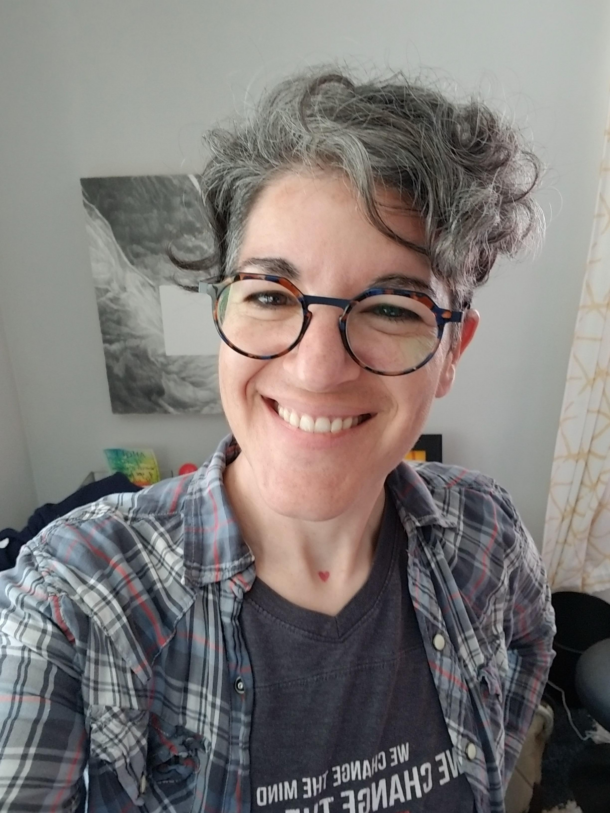I was just barely 13 when she was born, the grandchild of an unlikely friend. I suppose that made me her unlikely friend, I who was a random somewhat-older person who delighted her with pratfalls at her toddler command; who became the assistant leader in a Girl Scout Troop so she’d have a comfortable space for such an experience; who would supply pizza and art supplies when she wanted to host tween sleepovers in my college-years home.
With her blend of family influences, she was a child with toes in several versions of American culture and the way she expressed herself showed it. In an unconscious echo of my own mom, who would often say “Sayjal and I” after I’d reference something I’d be doing with my close secondary school friend, I would say to this kiddo, “You can talk like that with me and your friends, but if you want people to take you seriously, you need to use proper grammar.”
I eventually said to my mom, “I know it’s correct to say ‘Sayjal and I’ – I’m choosing to say ‘me and Sayjal.’” This kid mostly just waited for me to stop talking.
Even at the time, 20-odd years ago, something sat wrong with me as I corrected her, though, something that felt relevant to her melanin-rich skin. It’s only been in the last couple of years, as I’ve discovered along with so many others with melanin-light skin that anti-racism isn’t only a way of being but also an ongoing process of learning, that I’ve started understanding what’s been bugging me.
It’s about the ranking of cultural norms.
It strikes me as funny (of the uncomfortable, not laugh-inducing, variety) in this moment that what the textbooks consider grammatical perfection is called “King’s English.” As in, the monarchical rule that American colonists violently rejected nearly 250 years ago.
And yet we rank that as the MVP of languages spoken in this country over US-born dialects like Gullah, Louisiana Creole, or Black Vernacular English – over languages that were here long before European ships hit the shores, like Ojibwe, Shoshoni, or Arapaho.
It seems that in language, as in so many aspects of American culture, might equals right.
In my head, I hear all of the writers and editors and even coaches I have known throughout time: Clear communication requires agreements about language usage. And yes, there’s something to that – and there’s also a willingness to listen past our own biases in order to hear the message itself.
There’s also something to the slippery slope of ranking cultural norms, a slope that quickly dips into realms that impact our perception of a person’s professionalism. I said to that child, “…if you want them to take you seriously…” as in, “It’s up to you to conform so that you can have the life and career that match your dreams and intellect.” Oof.
In that uninformed perspective of mine, I was unknowingly buying into ideas of professionalism that exclude things like hairstyles on Black people that don’t mimic European hair (that is: natural, braided, or dreadlocked hair) or culturally-relevant clothing (think Supreme Court Justice Sonia Sotomayor being advised to ditch her trademark hoops and red nail polish for her confirmation hearings).
Ironically, I was also fueling my own self-consciousness since neither tattoos nor overt queerness (of both the gender expression and sexual identity varieties) fit into the dominant paradigm.
Anyone who doesn’t fit neatly into the dominant paradigm – whether due to skin color, language, education, sexual or gender identity, ideals of beauty, or what-have-you – and that’s a whole lot of people – live in a tension between conforming to the norm and challenging the norm. Each is exhausting in its own way.
If I could rewind these decades, taking with me the perspective I have now to that precious tween, I would say to her, “I want you to have as much information as possible so that you can make the decisions that honor and energize you.” I might even paraphrase Howard Thurman and add, “What the world needs isn’t your perfect grammar; it’s your enlivened you.”
What is getting in the way of your bigger life and badder self? Coaching is a powerful tool for unlocking that block and getting you moving.
Join others traveling in your direction; we’re holding your spot in The Bigger Badder Crew.
